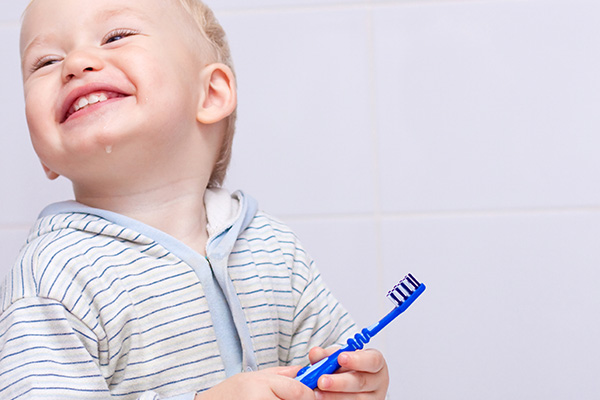Pediatric Dentistry: Infant Teeth Health FAQs

As your child begins to grow their first teeth, you may have some questions about pediatric dentistry. For example, you might be wondering why a child’s baby teeth are so important. You may also be wondering how you can care for your infant’s teeth. Read on to learn more.
Are an infant’s teeth that important?
There are many reasons why baby teeth are important. As the teeth grow in, they can help children learn to speak, as well as eat solid foods. The baby teeth also pave the way for adult teeth in later years. Parents should remember that oral health is about more than the teeth.
If a baby’s tooth gets a cavity, the infant will be extremely uncomfortable. An infection also enters the blood and causes other health issues. The bacteria from an infection can also move to another part of the child’s mouth and cause more infections. The adult teeth can become infected as well.
When does teething start?
Teething happens when the teeth burst through the gums. Usually, a child’s teeth will start to grow around four months. However, some children’s teeth may not come in until the children are a year old. Genetics will play a role.
When should a parent begin using toothpaste?
In pediatric dentistry, it is better to start using toothpaste as soon as possible. Parents can use an infant toothbrush to clean the gums as soon as the child is born. Once the child’s teeth come through, parents can start using a tiny amount of fluoride toothpaste. This can help strengthen the teeth. Infant toothbrushes are softer and smaller for a baby’s sensitive mouth.
What type of fillings are used for infant teeth?
Even with good care, a child can still develop cavities. To treat the cavities, a dentist can use white fillings. These fillings match the natural color of the teeth. Usually, the fillings are made out of composite resin. Unlike amalgam fillings, these do not contain mercury.
Mercury-free fillings can be healthier for the child. A composite resin filling can also help prevent tooth sensitivity. It protects the tooth because not as much tooth needs to be removed to place the filling. This type of filling will bond to the tooth better than an amalgam one would.
Can an infant have a dental emergency?
A child of any age can have a dental emergency. This can include a fractured, broken or chipped tooth. An extremely painful toothache is another type of dental emergency. Visiting a pediatric dentistry practice immediately is vital in a dental emergency. However, if a child has a very severe issue, the emergency room may be the better option.
Visit a pediatric dentistry practice today
A child should go to a pediatric dentistry practice by the age of one. This will allow your child’s teeth to be cleaned. You can also ask the dentist all of your questions about the health of your infant’s teeth. Making an appointment today can help you get on track with your child’s oral health.
Request an appointment here: https://www.canyonridgepediatricdentistry.com or call Canyon Ridge Pediatric Dentistry at (303) 841-7900 for an appointment in our Parker office.
Check out what others are saying about our services on Yelp: Read our Yelp reviews.
Related Posts
Routine visits to a dentist for kids lay the foundation for a lifetime of healthy smiles. Pediatric dental care is carefully structured to meet the developmental needs of children, offering a combination of preventive and restorative services that grow with them. With tailored guidance and techniques, a dentist for kids can preserve oral health and…
Children, who are particularly prone to tooth decay, should brush their teeth twice a day and make regular visits to a pediatric dentist. These healthy habits can help reduce the risks of developing cavities and serious dental issues. Using fluoride toothpaste is also an important step in childhood dental care that can add an extra…
Going to an emergency pediatric dentist can give your child immediate dental needs. Treating urgent dental issues can provide relief right away. It can also prevent complications. Here are the necessary steps that you can take even before the drive to your emergency pediatric dentist.Showing distress will only intensify the child’s anxiety. This will make…
Cavity treatment for kids is a common concern for many parents, as dental decay remains a prevalent childhood health issue. Early intervention and proper care are essential for maintaining healthy teeth and preventing future problems. Partnering with a pediatric dentist can take some of the guesswork out of promoting your child's oral health. To start…
